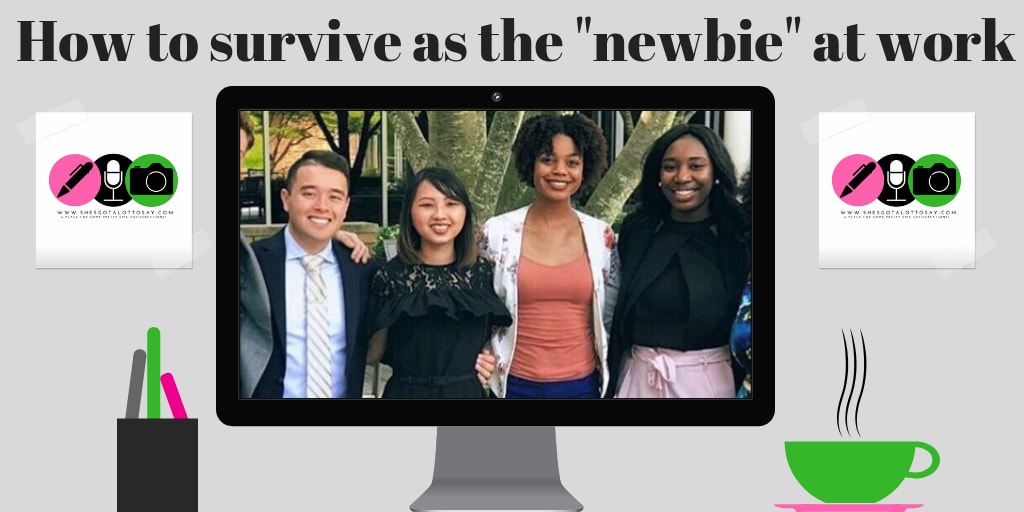How to Survive as the "Newbie" at Work
-- Career Advice --

Starting a new job can be challenging, especially if it is an industry that you are just emerging yourself into. Here are some tips on how to survive the workplace politics and make a name for yourself as the "newbie."
These 15 tips were compiled by four young professionals working in the media industry. Kristin Xiong, Danielle Crenshaw, Justin Crawford and I used personal experiences at our workplaces to give you advice on how to make it out there.
Here's my advice:
1. Be confident: You were hired for a reason. Your employer believed in you enough to hire you. Now it's time for you to believe in yourself. Confidence will radiate and will help in your performance.
2. Realize that you have so much to learn: Even if you have a degree in the field or some experience, remember that you are new to that workplace. There are procedures and policies you must acquaint yourself with. Find someone in the workplace with experience and watch them. Watch what they do and align yourself under them. It is always good to have a mentor in the workplace.
3. Ask questions: If you do not know the answer to something, just ask. If you're curious, confused, excited or even uneasy about something, ask someone. It's a lot better than sitting and trying to figure it out on your own.
4. Don't burn bridges that you can just untie: You are not going to get along with everyone. In fact, there may one or two people who just rub you the wrong way, but stay professional. Work with that person in the capacity that you must and then let it be. Don't burn that relationship just because you don't see eye to eye now. You may end up needing that person in the future.
5. Stand up for yourself: Some people may look at you as fresh meat. Don't accept treatment that you feel is unfair to you. Conflict resolution is important in the workplace. Don't argue or represent yourself in a way that is not flattering. If your communication with someone is straying from a level of professionalism, contact HR or your boss and have it handled immediately.
6. Keep track of what you do: Make sure that you keep track of all your projects, analytics and results. When it comes time for your job to evaluate you and decide on their need for you, be able to show them why you are an asset or better yet, a necessity.
7. Under-promise and over-deliver: Do not make it a habit to make promises to people. Especially, if you are unaware if you can make them happen. When working on something, set realistic deadlines that you can meet. Your team will be more impressed that you delivered something quicker than you said you would, as opposed to you not sticking to your promises.
8. Eliminate the finish line: This means that you need to have goals that are constantly evolving. You cannot view everything as the end to something. A finish line signifies that something is over. You need to set a goal, and once you conquer it, set another one. Think of this as rock climbing. Once you surpass one obstacle, you just keep on climbing. Once you get to the top of one mountain, you climb to one even higher.
Advice from Justin:
9. It's okay if you don't understand: You need to understand that everyone (and I mean everyone) was just as lost and confused about everything that goes on with a new role, especially so early in one’s career. I will say this with confidence that: the ones that come out on top in their careers later are the ones that are always willing to ask questions and learn from their mistakes. Nothing is more empowering as a young adult entering the workforce than one who is transparent, vulnerable, and willing to grow personally and/or professionally so early on.
10. Remember that it's "just work." Nothing frustrates me more than people who take their work too seriously. As if working as a young adult alongside older professionals isn’t intimidating enough... you will be just fine if you simply know your worth and do good work. It’s that simple, but (for some odd reason) workplace professionals make it so much harder than that.
11. Trust that you can make this exactly what you want: I advise anyone who gets in a first job that they dislike or find irrelevant to focus on what you can get out of it. At the end of the day, you need a job to make money and pays bills, so you might as well learn something and grow for yourself until something better comes along! Trust me, everyday I go into work, I think about what I can learn or do that will ultimately help me with my personal/professional goals.
Advice from Danielle:
12. You don't have to understand everything: When I started my job I sat in many meetings that I had no idea what they were talking about at all. Just know that it's okay! You will learn. I have to constantly remind myself that most of the people I work with have been here for at least five or more years. Just make sure you listen, pay attention, take notes, and ask questions when it's an appropriate time. I promise you will get it, and everyone knows you're new and they're not expecting you to know everything most of the time.
13. Be able to take criticism: Don't get discouraged if you receive criticism over your work. It can be really frustrating, especially if your job is more in the creative field where you normally have more free range with what you're doing. Try to sit back and understand why you are receiving the criticism.
Advice from Kristin:
14. Engage in meetings and in conversations: You may be the newbie at the office, but your opinion is still valuable! Make an impression, show your manager(s) and coworkers that you care about the subject and projects that are going on. And if you don't understand the lingo that your office use or the topic of the discussion, speak up and ask questions. Develop positive relationships
15. Develop positive relationships: Having a great relationship with your coworkers and your manager(s) will enhance your job/career experience and make work much more enjoyable. Having a good relationship within your organization will also benefit you in the long run, people are more willing to help you, for example, with projects, and when it comes to giving evaluations.
16. Don't forget to take care of yourself: Starting a new job can be stressful, especially if you're in a new job location, dealing with a new team, learning new tools, and etc. Don't forget to take care of yourself in the first weeks/months of your new job. Learn to maintain a great work-life balance that will keep you happy and stress-free.
As young professionals in the rising media industry, we know how competitive it is. We fully understand how difficult it is to rise to the occasion and deliver at this early stage in your career. It's okay! There is light at the end of the tunnel! Take it one day at a time.
About the Creator
Alyssa Wilson
I am a passionate writer and blogger ready to provoke interesting conversations. Check out my blog at www.shesgotalottosay.com






Comments
There are no comments for this story
Be the first to respond and start the conversation.